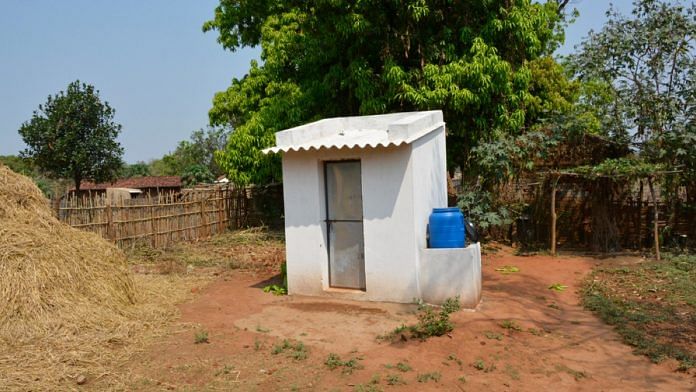New Delhi: Differences emerged between two central ministries over a question in the sixth round of the National Family Health Survey (NFHS-VI) pertaining to the use of/access to toilets, ThePrint has learnt.
According to sources in government, the Ministry of Health and Family Welfare, which drives the nationwide survey conducted every three years, phrased the question thus: “Whether you and your household members have a toilet facility that you can use?”
The Department of Drinking Water and Sanitation, which was merged with the Jal Shakti Ministry in 2019 and implements the Swachh Bharat Mission (Grameen), wanted the question to be rephrased as: “Whether you and your family members have access to a toilet?”
However, the health ministry overruled the department, leaving it none too pleased.
ThePrint reached the Ministry of Health and Family Welfare via call and text for comment but had not received a response by the time of publication. This report will be updated if and when a response is received.
At the heart of the tussle is the last round of NFHS, or NFHS-V (2019-21), which captured a decline in the usage of toilets built in rural India under the Swachh Bharat Mission announced by Prime Minister Narendra Modi in his inaugural Independence Day address in 2014.
The Jal Shakti Ministry, sources said, feels that numbers indicative of a decline were primarily the outcome of “flaws” in questions pertaining to sanitation in NFHS-V. This prompted the Department of Drinking Water and Sanitation to suggest to the health ministry that certain questions prone to drawing inaccurate responses from surveyees be changed before the launch of NFHS-VI, which included five questions related to sanitation.
This intervention, the water ministry believes, would help capture the “actual achievement” of the Swachh Bharat Mission. “That is why the water ministry suggested that questions be rephrased. But the health ministry retained the old questions. And naturally, it may not capture the coverage of the Swachh Bharat Mission accurately,” an official with the Jal Shakti Ministry told ThePrint on condition of anonymity.
To that effect, Vini Mahajan, secretary, Department of Drinking Water and Sanitation, wrote to the then health secretary Rajesh Bhushan outlining the suggested changes, including the need to capture not just usage but also “access” to toilets, in NFHS-VI — fieldwork for which began in June this year. ThePrint has seen a copy of the letter.
But the suggested changes did not make it to the household questionnaire component of the survey, which is among the largest data sources on population, health and nutrition in India. Its sixth edition will cover approximately 6.76 lakh households across 371 districts.
In the letter dated 24 May, 2023, Mahajan suggested to Bhushan that the NFHS-VI must incorporate a question on access to toilets. The question on usage of toilets, which was part of the NFHS-V questionnaire, was prone to “respondent bias”, she added.
“Access to toilet needs to be included in the question. It has been observed that access to toilet is the most important determinant of usage of a toilet, and hence it must always be explicitly captured while assessing toilet usage behaviour,” wrote Mahajan, a 1987-batch IAS officer of the Punjab cadre.
She suggested that question number 40 — “Whether you and your household members have a toilet facility that you can use?” — be replaced with: “Whether you and your family members have access to a toilet?”
According to Mahajan, this was “necessary to ensure that chances of respondent bias are minimised while answering as the reference to usage in the original/unedited question and the responses which fundamentally seek to enquire about access to toilet appear incongruous”.
“Therefore, alignment of the responses and the questions are necessary. This change will also help in independent verification of the actual achievement of the ODF campaign,” she added.
The other three sanitation-related questions in NFHS-VI are: “What kind of toilet facility do members of your household usually use?”; “Where is the toilet facility located?”; and “Including your own household, how many households use this toilet facility?”
To bolster their argument, officials of the water ministry also cited a joint statement issued by the Jal Shakti Ministry and the Ministry of Statistics and Policy Implementation (MOSPI) in November 2019 saying that “respondent bias in the reporting of access to latrine” may have crept into data collected as part of the National Sample Survey (76th round) on “Drinking Water, Sanitation, Hygiene and Housing Condition”
“This bias may have led to significant under-reporting of sanitation coverage. Such biases are often observed in households when canvassing information on items and issues where government funded beneficiary schemes are under implementation,” the joint statement had said.
ThePrint reported earlier how the World Bank, allegedly under pressure from the Government of India, retracted three papers — one on progress on sanitation in rural India, another on process and delivery of Swachh Bharat Mission (Grameen) and a third on the quality of groundwater in India — published in September this year. The papers relied on various official data sources including findings of NFHS-V.
(Edited by Amrtansh Arora)



